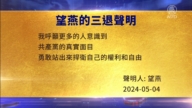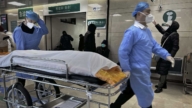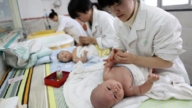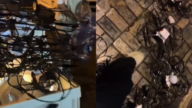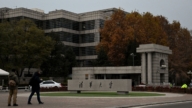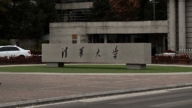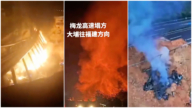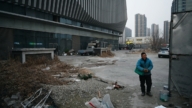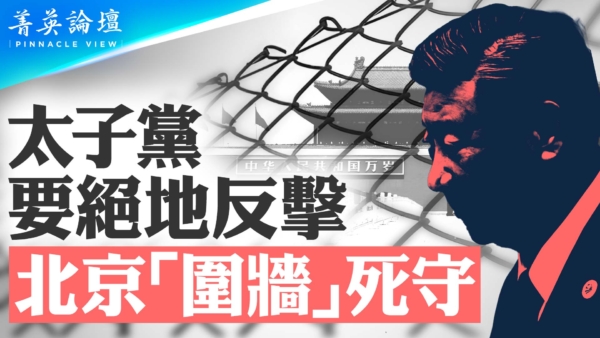【新唐人2014年01月04日訊】去年(2013年)底,內蒙古自治區原呼和浩特鐵路局副局長馬俊飛,因受賄罪和巨額財產來源不明罪被判死緩。總價值超過1億3000萬元的錢物堆滿了馬俊飛的兩所房子,但他聲稱從沒有動過贓款,而且,他在當官期間最頭痛的事就是藏錢。貪官為藏錢而頭痛卻不罷手,為甚麼中國會出現這種奇觀?請看報導。
原呼和浩特鐵路局副局長馬俊飛,位在呼和浩特和北京的住宅中,被查獲的現金有人民幣8800萬、美元419萬、歐元30萬、英鎊2萬、港幣27萬,黃金43.3公斤。除去可查明來源的受賄款外,還有6300萬元的賄款來源不明。
任職僅22個月的馬俊飛貪污1億3000萬,平均每個月受賄近600萬元,每小時受賄近萬元。
馬俊飛聲稱,最頭痛的事就是藏錢。
實際上,他把金條、美元、歐元等價值不菲的收藏品,簡單的堆滿兩所房子,直到2011年6月案發。
大陸網路專欄作家劉逸明認為,中共官員財產公開之所以遭受這麼大的阻力,最根本的原因就是貪官太多。
大陸網路專欄作家劉逸明:「中共官員貪腐腐敗是常態,清官是很少很少,普遍都是貪官,只是看貪多還是貪少。但是級別並不算高的官員,居然貪污這麼多,確實還是令人震驚的。」
大陸公民田先生表示,中共把所有私有財產公有後,到現在又被這些利益集團把公有財產佔為私有了。
大陸公民田先生:「政府貪污腐敗是體制所決定的。因為中共起家就是打土豪分田地,逼資本家公司合營,逼他們空降跳樓。」
在中國,像馬俊飛這樣找房子藏錢的貪官還不是個案。還有:「廣東疾控中心免疫規劃所」所長羅耀星,為藏錢租豪宅﹔而河北省外貿廳副廳長李友燦,也買別墅專門用來藏錢。
北京維權人士吳田麗:「前兩年東城區抓一局長,怎麼抓的?他跟他兒子買房子,買昌平天通苑哪兒的房子,從來沒人住過。到了那地方屋裡全是錢,倆人晚上老是搬錢。人們覺得奇怪,這哪人啊?後來一查,往他家一翻,都是錢。這種事在中國來說屢見不鮮。」
北京維權人士吳田麗認為,貪污成了中共官員的習性,大家都貪你要不貪就幹不了。中共官員已經擺脫不了體製造成的這種無官不貪的現象。
其實,貪官發明瞭很多「藏錢高招」,如把錢藏在臥室裡的抱枕內、床鋪下、穿衣鏡夾層和衣櫃等,還有的藏在衛生間的排氣扇裡、廚房的米缸裡,無奇不有。
貪官「藏錢的創意」還不僅侷限在屋內的各個角落。如:前重慶司法局長文強,他將上千萬現金,用油紙包好,藏到魚塘的淤泥裡﹔而江蘇省建設廳前廳長,把錢藏到樹洞裡、和屋頂的瓦下,甚至是糞坑裡﹔另有﹕贛州原公路局局長,將密碼箱埋在農村三哥家旁邊的垃圾堆下。
不過,時事評論員林子旭指出,雖然中共的小貪官很會藏錢,那些大貪官,早已把錢轉移到國外去了。
時事評論員林子旭:「當下的中共危機四伏,中共官員早就看清了這一點。現在他們貪錢更加歇斯底里,同時紛紛想辦法向外轉移,這或許就是中共行將就木的徵兆。」
2012年2月號的香港《動向》雜誌報導,中共曾展開一項內部調查,其中顯示,第17屆中央委員會、紀委委員和候補委員中,直系親屬在西方國家居住、生活、工作或已加入所在國國籍的佔近90%。
美國政府的統計也顯示,中共部級以上的官員,包含已退位的兒子輩,74.5%擁有美國綠卡或公民身份,孫子輩的超過91%的有美國公民身份。
去年香港《爭鳴》雜誌也揭露,中國持雙重國籍者超過800萬人,已經離退休省部一級的高幹直系親屬中,有5萬6千至6萬人持雙重國籍﹔現職省部級直系親屬,有1萬8千至2萬人持雙重國籍!
採訪/田淨 編輯/宋風 後製/孫寧
Funny Or Pathetic? Bribes Are The Biggest Headache
For Corrupt Officials
At the end of 2013, the former deputy director of Inner
Mongolia Hohhot Railway Bureau, Ma Junfei was sentenced
to death with reprieve on charges of bribery and accepting
large amounts of property from unidentified sources.
Assets with a total value of more than 130 million Yuan
were found filling up two rooms.
But Ma Junfei claimed that he never touched the stolen
money and, that he got a headache from hiding the money.
Why is there a spectacle in China involving corrupt officials
who have headaches from hiding money but can』t give it up?
Let’s look at the report.
In Hohhot and Beijing, at the residences of Ma Junfei,
former deputy director of the Hohhot Railway Bureau,
RMB 88 million, US$4.19 million, EUR 300,000, £20,000,
HK $270,000 and 43.3 kg of gold were seized.
The source of 63 million RMB is still uncertain,
but what is known is that it is bribe money.
Ma Junfei embezzled 130 million RMB in his 22 months
serving, an average of nearly 6 million-worth of bribes
per month and 10 thousand-worth of bribes per hour.
Ma Junfei claimed that thinking about how to conceal
the money gave him huge headaches.
So, he simply decided to fill two houses with gold bars, euros,
dollars and other valuable collectibles up until June 2011.
Mainland Internet columnist Liu Yiming believes
that the primary reason public officials have fiercely resisted
property disclosure is because of the deep level of corruption
and the vast number of officials involved.
Mainland Internet columnist Liu Yiming: “Most CCP
officials are corrupt and very, very few are honest
and upright; the only difference is their level of greed.
It’s shocking that the officials are so corrupt, even officials
at lower rungs.”
Mr. Tian, a Mainland citizen, noted that private property
was made public by the CCP, but now there are many
interest groups representing public property
as if it’s private.
Mainland citizen Mr. Tian: “Government corruption
in the Chinese Communist regime is a result of the CCP’s
expropriation of the local tyrants and distribution
of the land.
They forced the capitalists to jump off a cliff
and establish joint venture.”
In China, the case of Ma Junfei looking for a house
to hide illegal assets is not the only one.
Guangdong CDC immunization planning department
director Luo Yaoxing rented a mansion to hide assets;
while Hebei Province foreign trade department deputy
director Li Youcan also bought a villa to store money.
Beijing activist Wu Tianli: “Two years ago, a director was
caught in Dongcheng District, how?
Along with his son, he purchased an unoccupied house
in Changping district, Tiantongyuan.
The house was full of money and the two of them always
transported money at night.
People wondered where they were from, checked his
house, and found it full of money.
It is not uncommon in China.”
Beijing activist Wu Tianli believes that corruption
has become a habit of CCP officials;
It is nearly impossible to be an honest and upright official
when everybody is corrupt.
Chinese officials have been unable to escape from
the corruption phenomenon.
Corrupt officials thought up a plethora of places to hide
money such as the bedroom pillow, under beds, between
full-length mirrors, wardrobes as well as in the bathroom
exhaust fan and in the kitchen and rice tank.
Corrupt officials’ creativity in concealing finances is not just
confined to every corner of the house.
For example, former secretary of Chongqing Justice Wen
Qiang wrapped tens of millions of dollars in oil paper
and buried it in the mud of a fish pond,
while the former director of Jiangsu Provincial Construction
Department hid the money in hollow trees, roof tiles
and even in a cesspool.
Former Ganzhou Highway Engineering Co. director buried
the a suitcase full of money under the filthy dump
by his third brother’s home in a village.
However, political commentators Lin Zixu pointed out that
although the corrupt officials are good at hiding money;
the very corrupt officials already transferred
their assets abroad.
Political commentator Lin Zixu: “The CCP officials
are threatened by the growing crises.
Now they are even more hysterically attempting to transfer
the money abroad.
This might be the sign that the CCP is dying.”
Hong Kong “Trends" magazine reported in Feb. of 2012
that the CCP has launched an internal investigation which
revealed that 90 percent of the immediate family members
of the 17th Central Committee, members of the Commission
for Discipline Inspection and alternate members are living
or working in the Western countries and have even changed
their citizenship.
U.S. government statistics also show that 74.5 percent of CCP
ministerial level and above officials, including the second
generation of abdicated officials, have green cards
or U.S. citizenship.
More than 91 percent of their third
generation have U.S. citizenships.
Last year, Hong Kong “Chengming" magazine also revealed
that more than 800 million Chinese people hold dual
nationality; 5,600 to 6,000 immediate family members of
retired provincial and ministerial cadres hold dual citizenship.
18,000 to 20,000 immediate family members of current
provincial and ministerial officials hold dual citizenship.


